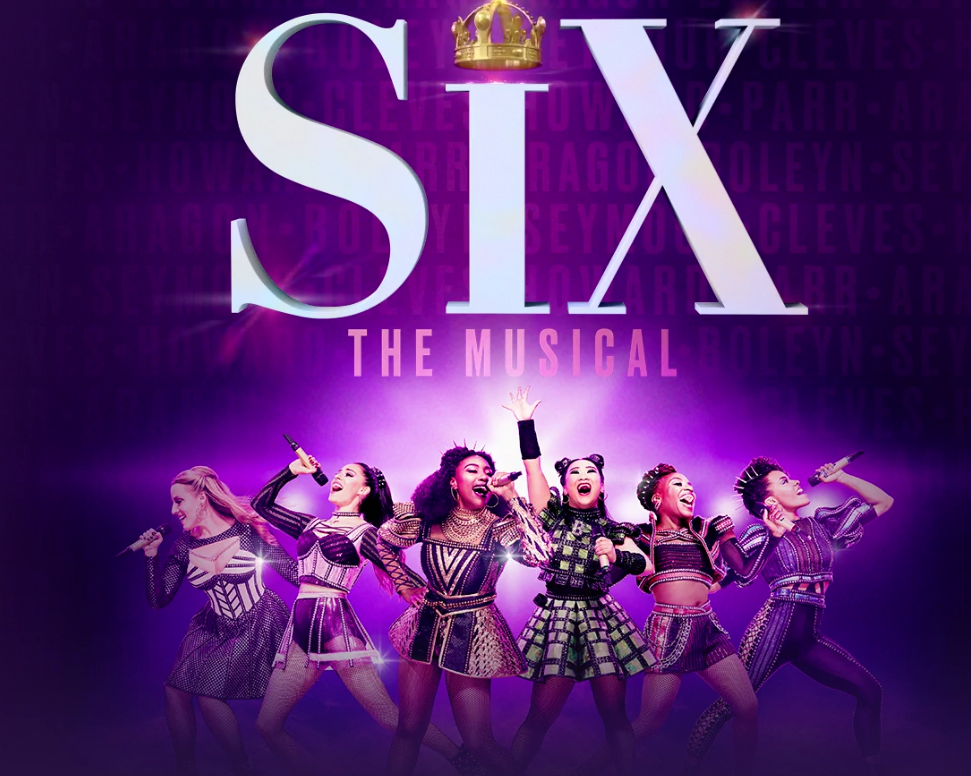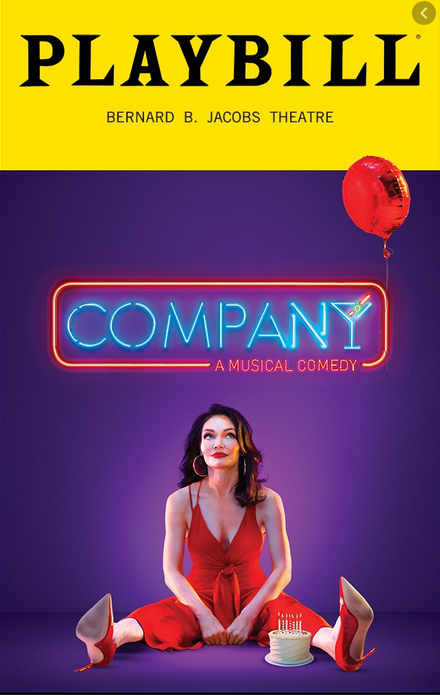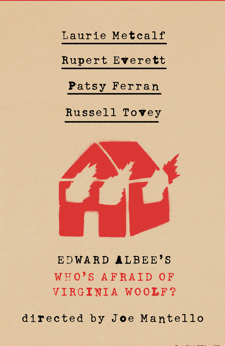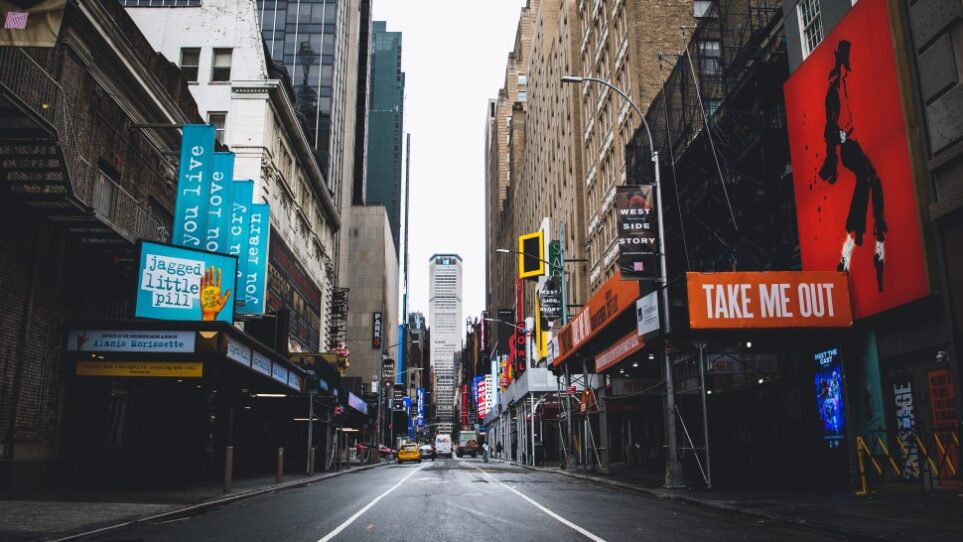On Saturday, I was pondering aloud when theatre may come again in London, after the false hopes of the post-lockdown 2 re-opening was brought to a crashing end when London (and many other regions of England) were thrown into Tier 3, then the newly created tier 4, in which live performance is prohibited.
I’ve applauded the efforts of producers and theatre owners alike who’ve moved mountains to comply with the government’s COVID-safety regulations, only to find that they are not sufficient when faced with a national lockdown. And I now seriously doubt any producer would risk the sort of financial capital that it takes to rehearse, stage and promote a brand-new show, like the Palladium’s Pantoland, only to have it fold after just six public performances, even before it reached its planned press night.
Sonia Friedman, who brought the rather more intimate (and therefore I assume a lot cheaper) two hander The Comeback to the Noel Coward rushed press performances in for it when the originally planned ones looked like they’d be scuppered by the enforced closures, so at least she’s got (mostly) great reviews — The Times was an outlier — to use to promote it now if and when she can bring it back. Another two-hander — a revival of AR Gurney’s Love Letters that was launched at the Theatre Royal in Windsor in October — also came to the Haymarket, and managed to get to its press night there, but again was derailed by the re-imposition of restrictions.

Pity the poor British-led team of producers — Kenny Wax, Wendy and Andy Barnes and George Stiles, joined by Broadway’s Kevin McCollum — who were taking Six to Broadway in March (pictured above), only to have the plug pulled 90 minutes on the very night they were due to open — March 12 — when the theatres were closed with immediate effect from that night. As Broadway operates a system in which critics are invited ahead of the opening, and publish simultaneously online on the night that the show opens, the reviews were ALREADY written…. but none were run, when the opening was suddenly cancelled.
And whereas the West End version of Six was able to temporarily transfer to the slightly larger (and currently available) Lyric Theatre on Shaftesbury Avenue — whose incoming tenant after the closure of Thriller Live has inevitably been postponed — when it did come back to London last month, its New York opening has been indefinitely suspended. Every Broadway theatre closed from March 12, and nobody has any idea yet of when they might return. This year’s Tony Awards were cancelled, with only part of the eligible season having managed to open, but then reinstated with nominations announced for the shows that had already opened — though there’s still no date for when that the ceremony itself might actually occur.
So Broadway is still very much in a holding pattern. In a joint interview with some key Broadway players — including the aforementioned McCollum, and Britain’s Chris Harper whose transfer of the West End Harper/Elliot production of Company was in previews and due to open on Sondheim’s 90th birthday, March 22 — on deadline.com last week, Charlotte St Martin, president of the Broadway League that represents theatre owners and producers, commented, “It could easily be we open five shows or three shows and wait two weeks and see if there are any incidents or any spikes. There are other logistical things that have come up, because we’ve never opened 35 shows or 30 shows at once, and many of the shows have the same director or the same choreographer or the same costume designer, and when you look at how long we will have been out, there’ll be a lot of new cast members.”
McCollum for his part urged caution: “The thing to watch is, are [shows] going to try to start too early? Anybody who’s recovering from an injury would love to get out and start jogging, but sometimes you have to walk a little bit, and we’re really in that place where we have to fold in, in a collaborative way as competitors.”
Logistically speaking, though, his show Six is in a good place: “Six doesn’t have an intermission, so we won’t have to deal with intermission protocol like bathrooms. We’re rehabilitating the theater with all the protocol that is going to be needed backstage and front. The cast is not a huge cast, and there’s no couple-dancing, as it were. There’s not the lifting and flipping onstage that a lot of shows have. Our backstage is not too crowded, we have a really nice-sized theater, and we have a number of entrances. I think Six will be a very good model.” (It also has the added virtue that the critics have already seen it — and their reviews are already in the bank, ready to run the moment the show resumes).
But he’s not quite as confident of bringing back his bigger show Mrs Doubtfire, that was also in early previews when the curtains came down, so quickly. “With [Mrs.] Doubtfire, well, here’s the thing: I think school has to open first. We are a family show. We are multigenerational. Six is targeting multi-generations as well, but people can come to Six in pairs and threes. People will come that way to Doubtfire, but they’re also going to come in groups and families. We had an $11 million advance that we had to return, with a lot of groups, and group business is going to take a little while to get back. I think we’re going to need to open after we get a couple of months of school under our belts. I believe Doubtfire will be later in the year, if not early into 2022”.

And speaking for Company (pictured above), Chris Harper noted how demoralising the London experience of re-opening, and then closing again, has been: “In London, the whole swinging backwards and forwards has been really difficult. Out of the nine months that we’ve been experiencing this, [the day when reopened productions were shut down again] was, for me, the lowest day of all. To see all of my colleagues who have invested so much time and money and energy and passion into putting on shows and then some of them only [just reopened] and are closed again, it’s heartbreaking. A number of people involved in the shows had gotten jobs being Amazon drivers or shelf stackers in supermarkets to try and survive, and they gave up those jobs to go back and do theater.”
He’s circumspect about the challenges of bringing Company back, though he assures Deadline, “We will be back. I can say with that with absolute certainty. We were getting standing ovations during the show. But it will certainly take months, not weeks, to get back up. You need time to rebuild ticket sales, to market the show and get the whole machine working again. Broadway is an expensive business.”

I had my regular late winter trip booked to catch the season’s new openings just a few days after the theatres closed — my husband and I were due to fly out on March 16. And top of my list was Company and Mrs Doubtfire, as well as the transfers from London of Caroline, or Change (first seen at the Minerva, then Hampstead and the Playhouse) and The Lehman Trilogy (with its National Theatre cast intact) that were yet to open, and the transfer of Girl from the North Country that had just opened to rave reviews. I was also looking forward to the transfer from downtown’s New York Theatre Workshop of a new musical called Sing Street and a star revival of David Mamet’s American Buffalo, with Laurence Fishburne, Sam Rockwell and Darren Criss. Others, like the Broadway transfer of Martin McDonagh’s Hangman and a revival of Who’s Afraid of Virginia Woolf? with a cast comprising Laurie Metcalf, Rupert Everett, Russell Tovey and Patsy Ferran (poster above) had played just thirteen and nine previews respectively before the shutters came down, and won’t now open at all.
Another musical that was cut short during previews, Diana — about the late Princess of Wales — was filmed instead for showing on Netflix instead before it plans a return when Broadway re-opens, so the Netflix outing is a kind of advice preview tool, much like Andrew Lloyd Webber used to release concept albums for shows like Jesus Christ Superstar and Evita long ahead of their stage incarnations.
The very first time I interviewed Lloyd Webber, back in 2008, he told me that he was anticipating a big change in the way musicals happened in the future. “It will continue to change in ways that neither you nor I can see at the moment. In the next year or two – and it sure as hell won’t be me – there will be some kind of musical or entertainment that is evolved on the internet. Quite what it is I don’t know, but I sense that’s where it will come from.”

And he’s just been proved completely prescient. Last week a work-in-progress benefit performance took place of Ratatouille: The TikTok Musical, a crowd-sourced adaptation of the 2007 animated Oscar winner. As Peter Marks, theatre critic of the Washington Post, wrote in a review of it, “Like every other place in Theater Land, Tryout Town has resettled on the Web. It actually proves to be an advantageous setting for works in progress such as the embryonic and revolutionarily assembled Ratatouille: The TikTok Musical.”
He went on to state, “At a running time of 51 minutes, and with perhaps only half the numbers required for a full adaptation of the 2007 animated Oscar-winner, this Ratatouille is a mere appetizer. But with a winning Tituss Burgess [pictured above with chorus] as the human embodiment of Remy, the Parisian rodent who can stir up a mean beef bourguignon, it is a promising first course. And the harbinger of a future property on the school circuit or maybe even in some professional incarnation. (Another leading indicator: The Actors Fund announced that the production surpassed $1 million in ticket sales on its premiere night.)”

